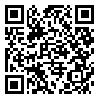دوره 4، شماره 3 - ( 7-1399 )
جلد 4 شماره 3 صفحات 161-159 |
برگشت به فهرست نسخه ها
Download citation:
BibTeX | RIS | EndNote | Medlars | ProCite | Reference Manager | RefWorks
Send citation to:



BibTeX | RIS | EndNote | Medlars | ProCite | Reference Manager | RefWorks
Send citation to:
Panahi S, Ashrafi rizi H. Designing a Database based on Medical Staffs’ Experiences: Commentary on COVID-19. EBHPME 2020; 4 (3) :159-161
URL: http://jebhpme.ssu.ac.ir/article-1-280-fa.html
URL: http://jebhpme.ssu.ac.ir/article-1-280-fa.html
Designing a Database based on Medical Staffs’ Experiences: Commentary on COVID-19. 1. 1399; 4 (3) :159-161
چکیده: (2443 مشاهده)
COVID-19 is considered to be one of the crises that occurred at the end of 2019. It seems that the chain of crises never ends, and the occurrence of events is unavoidable. Normally, declaring an emergency for the hospital’s medical staff is the first reaction from the health authorities in each country concerning all crises. Thus, the medical staff will start their activities to rescue, transfer, hospitalize and release of the injured people. According to health regulations, the surveillance system must promptly expand its activity based on crisis recognition, including the continuous and regular collection of data related to public health, aggregation, analysis, and assessment of the health status (1). A common element of crises is the lack of time to make accurate and timely decisions (2). Although some commentators believe that the social nature of COVID-19 is different from other crises (3), the experience gained from other crises can be useful. World Health Organization (WHO) has currently faced a major challenge in confronting COVID-19. So, their only reference to deal with this crisis is using previously recorded experiences about other similar coronaviruses, such as Severe Acute Respiratory Syndrome (SARS) and Middle East Respiratory Syndrome(MERS) and some of the published information from other countries involved in the crisis. There is some documentation available in databases,but the vast experience of medical staff has been neglected. There is a chance that each medical staff had valuable experiences that would be forgotten over time. Indeed, medical staff is one of the main groups involved in dealing with the crisis and certainly gain much experience in
this area. Therefore, health practitioners can
use the experience of medical staff as tacit knowledgerepositories to manage crises during them or in case of facing future ones because their experiences are considered as primary information sources.
In this regard, in order to reduce the extent of damages, costs, and human casualties, the approach of recording and sharing their experiences should be taken into consideration at the national and even global levels. Authors have tried to address this important topic as well as the features of this database to encourage health managers to design it and to encourage medical staff to record and share their experiences.
نوع مطالعه: نامه به سردبیر |
دریافت: 1399/3/6 | پذیرش: 1399/6/30 | انتشار: 1399/6/30
دریافت: 1399/3/6 | پذیرش: 1399/6/30 | انتشار: 1399/6/30
| بازنشر اطلاعات | |
 |
این مقاله تحت شرایط Creative Commons Attribution-NonCommercial 4.0 International License قابل بازنشر است. |




